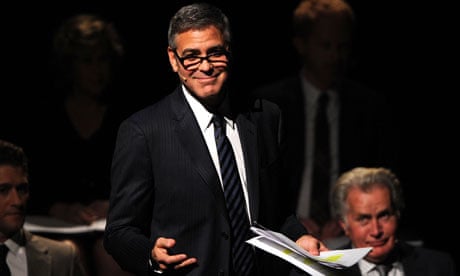On Saturday night in Los Angeles a group of A-listers tried to walk the precarious line between aesthetics and public service. George Clooney, Brad Pitt and Kevin Bacon took part in a staged reading of Dustin Lance Black's dramatic adaptation of the landmark case that overturned California's anti-gay marriage referendum, Proposition 8.
The result is a little wobbly. 8 is a condensed, episodic, collage of trial highlights, hammily read by a group of bafflingly good-looking people. Watching Pitt, his long straw-coloured hair pulled back and matted down, put on the sterilised airs of a US federal court judge, is somewhat distracting (Is Brad Pitt smart, by the way? He seems kind of smart. But whenever he recites smart dialogue it sounds like those words have never formed in his mouth before. Like the word 'statute'.)
8 is not an artful blend of technique and subject matter. The novelty of watching film stars, meant to add a little glamour to turgid court proceedings, wears off quickly, the selections of testimony for the first 30 minutes seem arbitrary, and the defendant transcripts were cherrypicked to sound as myopic as possible with the prosecution always getting the last, devastating word.
Still, the raw bits of the judicial record are at times so stunning they provide enough pathos to make 8 a lasting social document about the fight for American civil rights.
"Today we put fear and prejudice on trial," Martin Sheen, playing prosecutor Theodore Olson, says to the recreated courtroom. With his trademark crystalline elocution and paternal manner, Sheen channels all the moral authority he earned during his tenure as the West Wing's president Josiah Bartlet.
"How does preventing same sex couples from getting married advance the interest of procreation [of a straight] married couple," he asks the defence team pointedly.
Judge Vaughn Walker, played by Pitt, also puts the question to the defence. "What empirical evidence do you have?"
The response from defence attorney, David Thompson, played by Kevin Bacon: "I … I don't know."
8 has a purpose: to make public something that was made private. The lawsuit against Prop 8 (Perry v Schwarzenegger) would have been the first federal trial to live stream in some public courthouses and on YouTube. Two days before the trial's start date, the defendants, Protectmarrige.com and Campaign for California Families (the state declined to be represented in the trial) filed emergency papers for the supreme court to block broadcasting. The supreme court voted along ideological lines and ruled in favour of the block.
The trial began with the prosecution calling upon scholars, psychologists and gay couples for their testimony. 8 is an abridged version of the testimony and courtroom tete-a-tete with interstitial scenes between the plaintiff's family.
The highlights though, are with the defence. Like the Dred Scott decision, the Scopes "Monkey" trial, or Brown v the Board of Education, the most fascinating historical figures in this drama are those who stand in the way of history's lurching towards enlightenment. The best part of the Abraham Lincoln versus Stephen Douglas debates was always Douglas. In 8 it's the piss-poor defence of Prop 8.
The defence only called two witnesses. Both were submitted as experts. Dr Hak-Shing William Tan (played by gay actor George Takei) claimed if Prop 8 was not upheld, "other states would fall into the hands of Satan, one by one". Pressed for sources, Tan replied: "The internet". The other witness, David Blankenhorn, founder of the Institute for American Values, was so incoherent and contradictory, he was dismissed by Walker as unreliable and entitled to no weight.
Casting John C Reilly as Blankenhorn may have been a little too rich, for Reilly's greatest quality, besides his flubby bulldog features, is the earnest manner in which he tries to prove to you he is not a buffoon.
Clooney as prosecutor David Boies plays it suave, as is his wont (Nothing seems worth doing unless Clooney is having a good time, right?). He clearly delights in his role as the noble prosecutor, peering over the top of his glasses, tie loosened, shooting sarcastic smirks.
Jamie Lee Curtis and Christine Lahti are believable and sincere as the plaintiffs, a same sex couple whose marriage licence was denied.
Bacon is, surprisingly, the most natural and engaging to watch. His "I don't know" admission followed by a skittish recantation is deftly done and gives us the kind of cinéma vérité this project clearly craves.
Many scenes are abrupt, truncated and a little difficult to follow for lack of context but Black does give us some real moments of grace when he slows down and lets the natural drama play.
Most moving is the testimony of Ryan Kendall, played by gay American television actor Chris Colfer, who was once enrolled in "reparative therapy" for his homosexuality. When his parents read his private journal, they were aghast. His mother told him she hated him and he would rot in hell.
"You don't get anything worse than eternal damnation," he recounts mournfully. His parents flew him to a clinic in Encino, California, that purported to "convert" homosexuals to heterosexuals. When asked if the therapy worked, he cheerfully replies: "No, I am just as gay as I was when it first started."
The play closed to a standing ovation. The real life couples, their families, Boies and Olson joined the all-star cast on stage. Boies took the microphone and made the best case for the dramatic reading of the messy jurisprudence: if the trial had actually been broadcast it's unlikely that most would have watched the whole way through.
"We put fear and prejudice on trial," he concluded. "And fear and prejudice lost."
